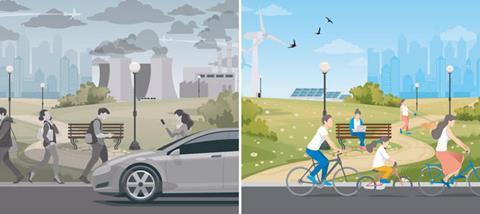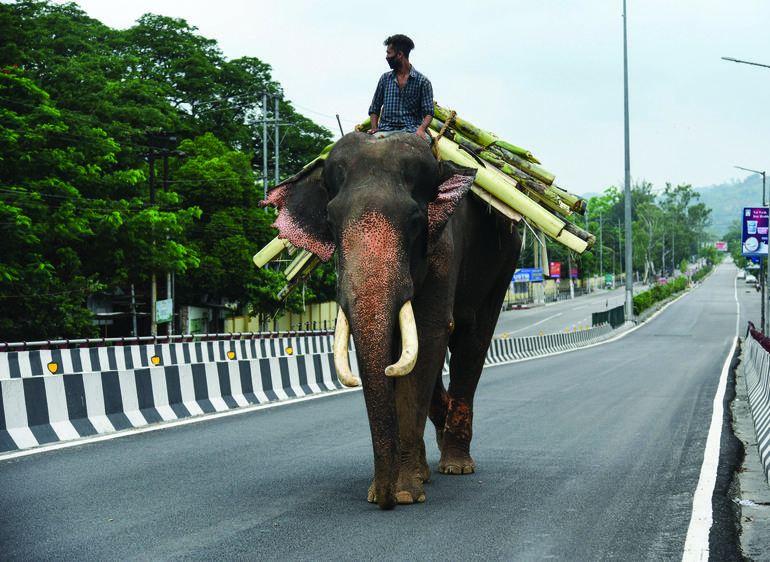
Since lockdown began, I have found myself reflecting again on the world we live in – how it is both incredibly wonderful, but also deeply wounded. Many of us have been reconnecting with the wider natural world, either through walks in city parks and gardens or further afield. We have rediscovered its beauty and learned how nurturing and good for our wellbeing it is to spend time outdoors. With hardly any traffic noise, there has been a beautiful stillness in the air. I found myself delighting in the birdsong that has accompanied me through all my days at home, in meetings with the back door open. Looking up at the sky today, it is clear blue with no aeroplane trails across it. The canal where I go for my daily walk became the clearest I’ve ever seen, when there were no boats using it (they usually stir up the mud).
This is a world of awe and beauty. A world that God has created, teeming with life, full of diversity and abundance and colour. And what neighbours we share this world with: the most incredible and stunning mix of strange, funny, scary, cuddly, scaly, odd, tiny, huge creatures that we could ever possibly imagine. Yet at the same time, we live in a world that is seriously wounded.
The Bible is clear that God, people and the wider natural world are deeply interconnected and if one aspect is hurt then everything will be impacted. Racial injustice, gender inequality and environmental breakdown are all part of the reality and the consequence of sin, at a personal level, but also structurally and systemically.
Environmentally, we don’t have to look very far to see the evidence of this. Our climate crisis is wreaking havoc in our world, causing extreme weather events, sea level rise and melting glaciers. In my work with Tearfund I see all too clearly the impact of climate breakdown on people in poverty; affecting their health, access to food and their security. There is a serious and urgent need to address the way we are using and abusing our planet if we are to prevent further wounds being inflicted on our global neighbours and on the world God created and loves, which we all rely on.
Covid-19
As hard as it is to hear, I want to be clear that the outbreak of Covid-19 is not a ‘natural disaster’. Rather it is a disaster of our own making. Viruses jump species and get into humans, and environmental destruction makes this more likely to happen, and with greater frequency, as people are brought into closer contact with virus-carrying animals. Deforestation, mining, the illegal bushmeat trade, animal trafficking and unsustainable agricultural practices are all likely factors at play. Add to this an addiction to flying, and we turn a virus into a pandemic.
The desperation of poverty and the greed of wealth underpin a global system that is fundamentally at odds with God’s original intention of peaceful and harmonious relationships between all things.
As we in the UK slowly emerge from the initial extremes of the global Covid-19 pandemic, we are asking what might lie ahead. Crises of this scale give us, as a society, the rare opportunity to ask big questions about who we are and what our place in the world is. Historically, pandemics have led to dramatic societal changes, and the Church has often played a significant role in that transformation. While the pandemic is likely to be a drawn-out crisis, Christians and churches can play a vital role in shaping what happens next. As we consider the end of lockdown, what can you and I do to build a better world? Here are my six ideas:
1. Pray
As Christians, our first inclination when we see the world in trouble must be to pray. Alongside intercession, there is a strong biblical tradition of lament where we cry out to God for the things that are not as they should be. Through the pandemic and the despair of seeing the impact of our broken relationship with wider creation, I have realised afresh the importance of holding this space and not being afraid of it; of not moving on too quickly. There is huge significance in mourning the brokenness of the world; in acknowledging our role within that, even if unconscious or unintentional. From this place we can repent and look to move forward on a new path, praying for the change we want to see in our own lives and the wider world.
For many busy people, lockdown has provided the opportunity to discover new rhythms of prayer and meditation. Rather than now speeding our lives back up to a busy pace, could we protect the much-needed space for unhurried prayer?
2. Learn
We know we live in a complicated world with complicated problems, where we are increasingly connected to, and reliant on, people on the other side of the world. My actions affect people and other creatures I have never met. Part of our responsibility before God as Christians is learning about what’s going on in his world, so that the choices we make and the actions we take are conscious and well-informed.
3. Speak up
Proverbs 31:9 says: “Speak up and judge fairly; defend the rights of the poor and needy.” We are called as Christians to stand up for justice, asking those in positions of power to make decisions that protect the most vulnerable people and the earth we all rely on. This is not just the responsibility of those who work for Christian charities or advocacy organisations. Every Christian is called to play their part in using their voice to help build a better world. Here are some key current issues we can speak out about:
• Post-lockdown rebooting of the economy: we need to be calling on the UK government to reboot the economy after lockdown in a way that prioritises the poorest, tackles the climate emergency and builds a better world for everyone. At Tearfund, our Reboot campaign helps you email the prime minister with some specific requests, and provides discussion material and an animation for you to use in your church (tearfund.org/about_you/action/the_world_rebooted).
• Climate change: One hugely important issue that we must hold governments to account on is slashing carbon emissions. Alongside meeting the requirements of the Paris agreement, this means delivering net zero carbon emissions as quickly as possible. One way to join with others in lobbying the government in the UK is through the Climate Coalition (theclimatecoalition.org), a network of more than 100 organisations made up of 19 million individuals.
• Rubbish: Another important issue we need governments to tackle is rubbish, particularly plastic waste, which is polluting our oceans, poisoning wildlife on a huge scale and causing disease and death in many poor communities who lack appropriate waste management systems.
4. Live
As well as asking others to act, we must look at our own lives and lifestyles, considering where we can make changes to be kinder to the planet and the people and creatures we share it with. Being part of the problem means we can also be part often solution. There are lots of steps we can take in our ordinary lives to make changes and help resolve these issues. Changing our eating habits is one area where we can make a big difference. Meat production is a big cause of greenhouse gas emissions, so let's switch to a predominantly vegetable and grain-based diet, buying local and seasonal produce and prioritising organic products wherever practical.
We can switch our domestic energy supplier to one that uses 100 per cent renewable energy, or even install our own solar panels, as well as planting trees and reducing our energy use (such as by choosing energy efficient appliances and turning things off wherever possible). We can reduce our waste, particularly plastic, and challenge ourselves to ditch single-use items. The key thing here is reducing, but reusing and recycling are also important, with the ultimate aim being the bare minimum going to landfill.
5. Give
The way we choose to spend our money shows what we value. As Jesus says in Luke 12:34: “Where your treasure is, there your heart will be also.” We can talk about these issues all we like, but unless we are using our own resources to make a difference, itis all in vain.
We should think about our bank accounts, investments and pensions – are we storing our money in an ethical way that does not harm other people and the earth? Many banks invest in unethical industries that are contributing to climate change and deforestation and bolstering inequality and injustice.
How about the money we spend and the things we buy? Are we considering how to be ethical consumers, making decisions that respect our global neighbours and the natural world?
For the money we give away, are we doing so generously? All of us reading this, whether we consider ourselves well-off or not, will be in the wealthiest two per cent of the global population. We have been incredibly blessed, and part of our Christian faith is using that blessing to bless others in turn. Our giving should reflect God’s care for the whole of his creation– people and the rest of the natural world – so donating to organisations that are addressing both is the best way forward.
6. Imagine
Walter Brueggemann is an Old Testament theologian who has written about having a “prophetic imagination”. His challenge is to allow the biblical story to so deeply shape our imagination that we’re able to envisage the world as it should be. It can sometimes be difficult for our imagination to extend beyond the realities we see around us in God's wounded world. However, as Christians, we are future-orientated people. Our lives are motivated by that vision of the future that we glimpse in Bible texts like Revelation 21 and 22; of a time when God will dwell fully with us, in a transformed heaven and earth. Then there will be no more suffering, sickness or death, the wider natural world will flourish with us, and there will be healing for the nations. We know we won’t see it fully until Christ returns to this earth and he dwells in our midst, in the transformation of all things, but can we cultivate an imagination that ‘sees 'a better future for our world? Can this prophetic imagination create in us a holy dissatisfaction with how things are currently, and cause a constant inner pull to be working for change and looking for a better future? Can we so deeply imagine this future reality that we embody its values in how we live today?
The lockdown measures have forced many to embrace a simpler way of living. There has been an opportunity for busy people to building new rhythms that enable better self-care than in the ‘old normal’: rhythms of prayer and meditation, regular exercise and time spent connecting with nature. As there has been less travelling, there has been the huge benefit of living with less pollution. Going forward, will we get back in our cars and allow the road traffic and pollution to build up again? Will we pick up our old travel habits or make different holiday choices and do more of our work meetings virtually? Will we rush back into the shops at the weekend or spend more time at home with family and friends? Will we find ways to continue connecting with and looking out for our neighbours?
Covid-19 is a wake-up call to us all and the crisis gives us a once-in-a-lifetime opportunity to reshape the world we live in. We have seen that we are capable of adapting incredibly quickly as human beings and as a society. Fundamental renewal feels not only desperately needed, but perhaps even possible.



































